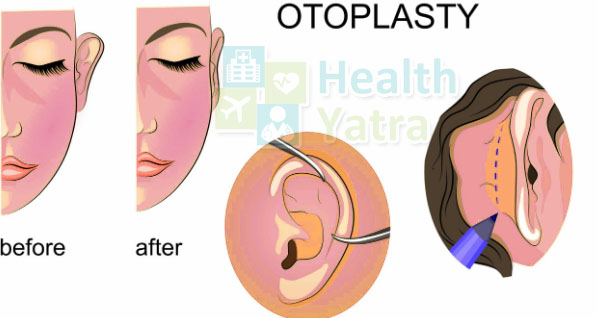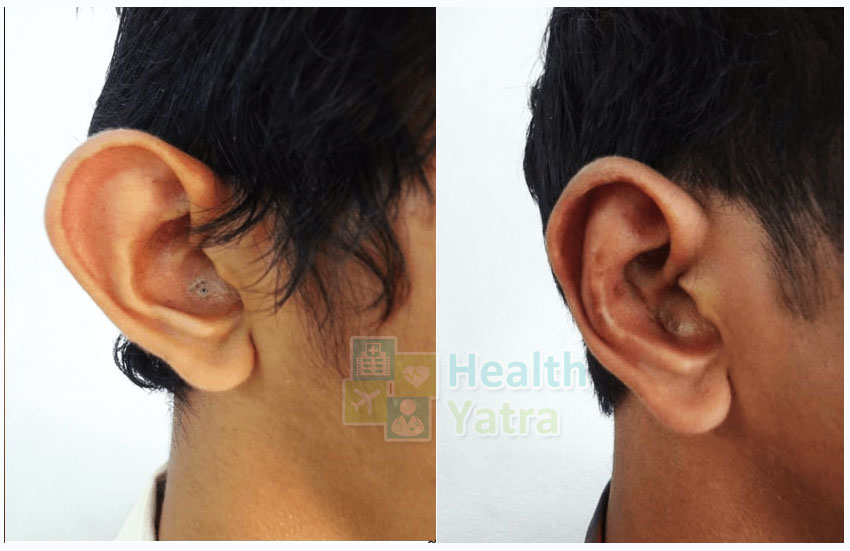Also known as Cosmetic Ear Surgery, Otoplasty is a surgical intervention designed to change position, shape & size of ears. Many people choose to undergo Otoplasty when they are bothered by how far their ears stick out of the head. Many people also consider Otoplasty when their ear or ears are misshapen due to birth defect of injury. Otoplasty can be performed on people of any age, especially after their ears have reached full size, which is usually after age 5 through to adulthood. Otoplasty surgery is also done as early as in age 3 in some special cases. Splinting may also be utilized to correct many issues if started immediately following birth in children born with certain ear-shape problems including prominent ears.
Why Undergo Otoplasty Surgery?
People may consider Otoplasty surgery as an option in the following conditions.
- When ear or ears are sticking out too far from the head
- When ears are comparatively large in proportion to the head
- When people are disappointed or dissatisfied with previous ear surgery
Otoplasty surgery can be performed at any age when ears have reached full size, which is usually after 5 years of age. However, Otoplasty will not change location of ears or alter the capacity to hear.
Good Candidates for Otoplasty Surgery
Otoplasty surgical procedure is generally performed for aesthetic reasons & in order to help improve self-esteem & body image of patients. Especially for people who are concerned about appearance of their ears to the point that they wear their hair so as to cover them, Otoplasty surgery is an ideal option. Good candidates for Otoplasty surgery should essentially be in good health & without having any preexisting medical conditions which could make this procedure unsafe for them.
Additionally, they should also fulfill the following criteria.
- Should essentially be of 18 years or older
- Having realistic expectations about outcome of Otoplasty surgery
- Must be non-smokers or willing to quit smoking
Preparing for Otoplasty Surgery
People will initially need to talk to a cosmetic surgeon about Otoplasty surgery. Plastic surgeons are most likely to ask the following questions during initial appointment for Otoplasty surgery.
- Reviewing Medical History – Patients undergoing Otoplasty surgery should be prepared to answer questions regarding past & present medical conditions, especially about any ear infections. Patients should let the plastic surgeons know about any medications they are taking or have taken recently including any surgeries they have undergone in the past.
- Conduct a Physical Examination – Plastic surgeons will invariably perform a physical examination so as to determine treatment options. They will examine patient’s ears including their placement, shape, size & symmetry. They may also want to take pictures of patient’s ears for maintaining medical records.
- Discuss Patient’s Expectations – Patients must explain to plastic surgeons as to why they would like to undergo Otoplasty surgery & what they hope for in terms of appearance following the procedure. Patients should also make sure that they understand risks, including possible overcorrection.
Patients will be required to undertake the following steps prior to Otoplasty surgery.
- Stop Smoking – Smoking reduces blood flow in skin & can therefore slow down the process of healing. In case patient smokes, cosmetic surgeons would recommend that they stop smoking 6 weeks before & after surgery so as to enable proper recovery.
- Avoid Certain Medications – Otoplasty surgery patients will need to avoid taking aspirin, herbal supplements & anti-inflammatory drugs before & after surgery as these can increase tendency for bleeding during surgical interventions.
- Arrange Help During Recovery – Otoplasty surgery patients should plan for someone to drive them back home after operation & to stay with them for at least the first night following procedure during recovery from anesthesia.
Otoplasty Cosmetic Surgery Procedure
Generally performed in a hospital as an outpatient procedure, Otoplasty surgery is normally performed under sedation or with local anesthesia which only numbs parts of the body. In some cases, general anesthesia which renders patients unconscious is also recommended. Otoplasty surgery techniques vary based upon the kind of corrections required. Specific techniques chosen by the plastic surgeon will determine location of incision & the scars which result.
Plastic surgeons may make incisions on the following locations.
- On the backside of ears
- Within inner creases of ears
Surgeons might remove excessive cartilage & skin after making incisions. They will subsequently fold the cartilage into proper position & then secure it with internal stitches. Additional stitches will also be used so as to close incisions. Otoplasty surgery procedure typically takes about two hours of time to complete.

Otoplasty Surgery Aftercare
Ears will invariably be covered within bandages for support & protection following Otoplasty surgery. Patients are most likely to feel some itching & discomfort in this condition. They can take pain medication as prescribed by the doctors. It would however be sensible to contact the doctors if pain medications are found to increase discomfort. Patients must ensure to avoid sleeping on the sides so as to keep pressure off the ears. They should also not try to rub or place excessive force upon incisions. It would be ideal to consider wearing shirts with loose-fitting collars or button-down shirts. Surgeons will however remove bandages just a few days following Otoplasty surgery. Ears at this point of time will most likely be red & swollen. Following this, patients will need to wear a loose headband which will cover their ears at night for at least 2 – 6 weeks. This will keep patients away from pulling ears forward while rolling over in bed. Patients should also speak to the surgeon as to when stitches would be removed. However, some stitches also dissolve on their own over time, while others must be removed at the clinic within weeks following Otoplasty procedure. Check with the surgeon as to when it is okay to resume daily activities like bathing & regular physical activity for routine work.
Risks & Complications of Otoplasty Surgery
Otoplasty surgery poses the following common risks.
- Asymmetry in Ear Placement – This generally occurs as a result of changes happening during the healing process. Moreover, at times Otoplasty surgery might also fail to correct pre-existing asymmetry.
- Overcorrection – Otoplasty surgery can at times create unnatural contours which make ears appear to be pinned back.
- Scarring – Although scars are permanent in nature, they are most likely to be hidden behind ears or within the creases of ears.
- Changes in Sensation of Skin – Repositioning of ears can at times temporarily affect skin sensation within the area during Otoplasty surgery. But it is quite rare that these changes are permanent in nature.
- Problems with Stitches – Stitches are commonly used to secure the new shape of ears & might sometimes work their way to the surface of skin & might require to be removed. This usually also causes inflammation of affected skin. Patients may therefore sometimes require additional surgery as a result.
Otoplasty surgery, like any other major surgery, poses risk of infection, bleeding & an adverse reaction to anesthesia. It is also sometimes possible that patients have allergic reactions to surgical tape and/or other materials which are commonly used during or after Otoplasty surgery procedure.
Otoplasty Surgery Outcome
After removal of bandages following Otoplasty surgery, patients can notice an immediate change in appearance of ears & which are permanent in nature. Patients who are dissatisfied with results should speak to the plastic surgeon & evaluate possibility of undergoing a revision surgery.
Low Cost Otoplasty Cosmetic Surgery in India
Several people suffer through years of being self-conscious about their ears. Most of them either have protruding ears or ears with cupped or unfolded shape which make them appear too large. Irrespective of the reason, Otoplasty surgery results can be dramatic & eliminate the problem while restoring confidence by creating a more pleasing appearance. While cost of healthcare including surgery is escalating beyond reach of the common man around the world, India is a globally favorite medical tourism destination offering a wide spectrum of excellent low cost healthcare solutions including cosmetic procedures like Otoplasty surgery for people from all around the world. HealthYatra is the fastest growing healthcare tourism company in South Asia which is reputed across several nations. They are associated with top surgeons & best internationally accredited hospital facilities in the country in order to provide high quality healthcare at reasonable costs. Healthcare professionals from HealthYatra would also be pleased to combine an exotic holiday with your Otoplasty plastic procedure so as to make your wellness travel a memorable experience.
KEYWORDS: Otoplasty Cosmetic Surgery in India, otoplasty surgery cost in india 2024, best otoplasty surgeon in india, laser ear surgery cost in india, otoplasty cost in mumbai, ear surgery cost near me, otoplasty cost in delhi, otoplasty cost in bangalore, ear surgery in india, Otoplasty Cosmetic Surgery cost in India, laser ear surgery cost in india, best otoplasty surgeon in india, ear surgery cost in india in rupees, ear surgery cost near me, otoplasty cost in mumbai, otoplasty cost in delhi, ear infection surgery cost in india, otoplasty cost in bangalore

